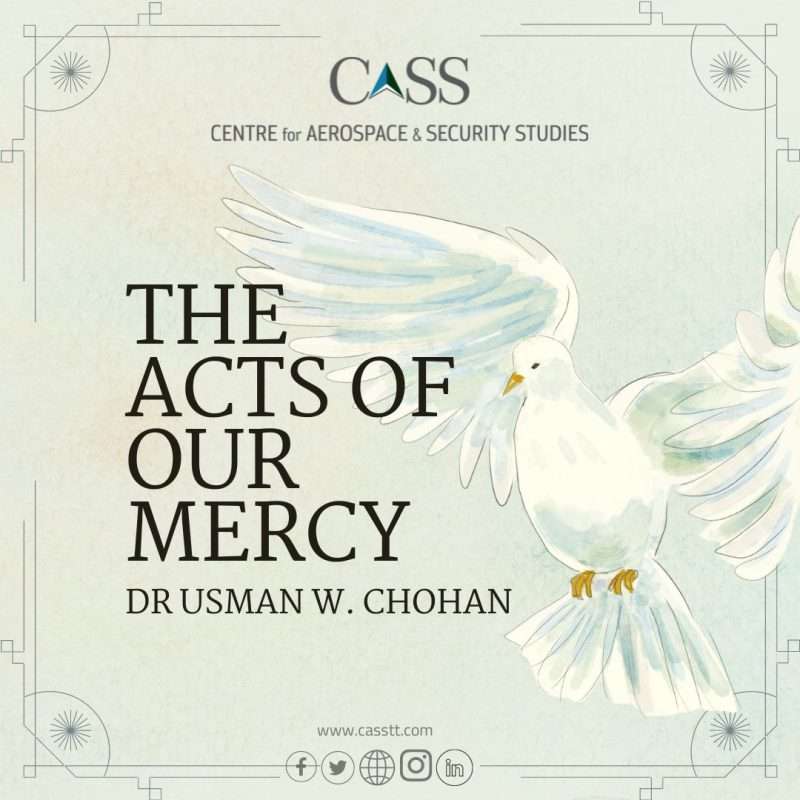On February 26th, 2019 the Indian Air Force (IAF) engaged in an hasty misadventure against Pakistan, and was met with an immediate and impeccably executed response that later came to be known as Operation Swift Retort.
In the heat of that confrontation, the Pakistan Air Force (PAF) shot down Indian airplanes and captured a single pilot alive. Wing Commander Abhinandan was taken into custody, interrogated, and offered a memorable cup of tea which he exclaimed was “fantastic,” truly a reflection of Pakistan’s hospitality.
The vivid image of the contented buffoon Abhinandan holding a cup of tea has been etched into the Pakistani imagination, and it has often served as a ready salvo in many social media altercations between Pakistani and Indian Twitterati.
Yet Abhinandan was subsequently released by Pakistan at the Wagah-Atari border as a gesture of peace – an act of mercy. In releasing him, Pakistan was telling its rowdy and ill-behaved neighbor that it could forgive India for its temporary madness.
Pakistan would act as a magnanimous victor, and not a belligerent one, so it could set the tone for a more harmonious working relationship with a seething and venal neighbor.
But Abhinandhan’s capture and the humiliation of the IAF in Operation Swift Retort was met with a puzzling jubilation in India. Long accustomed to weaving spin and deceit into their newsflow, the pundits of the Indian media sought to portray the bumbling dupe Abhinandhan as a kind of “hero,” with a Vivek Oberoi-directed movie in the works to boot.
Not only did the Indians fail to accept the futility of their unilateral violence, they also sought to engage in mass delusion and up the ante in their war hysteria. In fact, they took the aftermath of Operation Swift Retort towards a far darker place.
On August 5th, 2019, they did away entirely with any pretense of humanity in their illegally occupied territory, and unilaterally annexed the disputed territory of Kashmir. They then placed the Vale of Kashmir in a blanket of silence and terror, so the world would not see how the tentacles of their machinations would twirl.
This was followed by equally contemptuous moves by the Indian state, such as the promulgation of the Citizenship Amendment Act (CAA), that disproportionately hurt their Muslim population. At the same time, India hijacked international bodies, such as the shambolic FATF, to hamstring Pakistan through hybrid violence where their feeble attempts at kinetic violence failed.
This is the spirit with which India took Pakistan’s acts of mercy. Since 2019, India has stepped ever closer towards abject dysfunction, and yet Pakistan has firmly kept a hand of friendship open. It has continually asked India to behave like a mature state that could co-construct the foundations of a lasting peace.
But India listens not, and it leaves open wounds within its polity to fester. The demonetization disaster, the early failure to contain Covid-19 (especially in contrast to Pakistan’s pandemic performance), the brutal CAA, the unilateral annexation of Kashmir, their national macroeconomic paralysis, and the Three Farm Bills (against which protests remain widespread); they all point to a madness that has gripped India, ultimately to its own ultimate detriment.
This is the enraged beast, frothing at the mouth, to which Pakistan extends gestures of peace and acts of mercy. It is the rabid goliath to which Pakistan takes measured responses, such as the impeccably executed Operation Swift Retort, only to find India’s rage swell further.
It is difficult to see how such a predicament can be left to simmer forever. What characterizes the Subcontinent today is flashes of rage, arrogance, and blindness by the larger neighbor, and swift yet measured reponses from the smaller neighbor. How long do the rabid pundits of Delhi think that this dynamic shall continue?
Nearly two years since the execution of Operation Swift Retort, it becomes frighteningly clear that the path on which Delhi tramples today is an unsustainable one. South Asia remains a security flashpoint in world, and one where the plight of common folk (particularly in India) worsens by the day. Treating Pakistan as the Bogeyman for a litany of Indian problems can only work for so long, and the ruling party in Delhi already struggles to bank on a better excuse than finger-pointing at its neighbor.
Yet for the sake of the Indian masses, if not for those of Pakistan, the fanatics in Delhi must desist from their blind rage and adopt the behavior that befits a normal country. In other words, the biggest lesson since Operation Swift Retort is that India must engage in an act of mercy: towards itself.
The writer is the Director for Economics and National Affairs at the Centre for Aerospace and Security Studies (CASS). The article was first published in THE NATION. He can be reached at [email protected].





